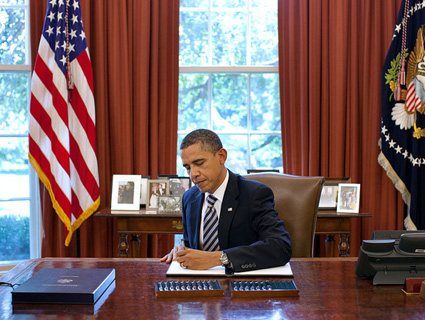President Barack Obama won in 2008 with independent voters (and, of course, a hyper-active base of Democrats). But after a year of the Obama presidency, independents were souring on him, and by the 2010 mid-term elections, they seemed to be quite skeptical of the former candidate of hope and change. Thus, one important component of Obama’s reelection strategy is obvious: win the independents back. One way to revive their affections, the thinking goes, is for Obama to rise above Washington’s increasingly bitter fray and produce compromises that demonstrate his ability to make the divided capital function for the American people. Last December’s tax-cut deal fit this strategy. Obama was able to show independents he could forge a compromise with obdurate Republicans—plus, he produced a mini-stimulus for the sputtering economy.
As for this week’s debt ceiling compromise—that seems to be another story. The deal yielded no immediate results that will bolster the economy (though it did prevent GOPers from blowing up the economy), and independents seem to be unimpressed. As Chris Cillizza of the Washington Post and others note, the most interesting aspect of the initial polls taken after the denouement of Debtageddon is that indies are not keen on the compromise. A USA Today/Gallup survey found that 50 percent of self-identified independents disapprove of the compromise; one-third approve. CNN’s survey found that 62 percent of independents are thumb’s-down on the deal. (The deal does better with the whole population—39 percent approve, and 46 disapprove in the Gallup poll—because Democrats (far more than Republicans) considered it a positive outcome.
So if the independents don’t like this deal, does that mean Obama won’t accrue the political bennies he might expect to rack up among this slice of the electorate? In polling during the weeks running up to the final deal, Obama consistently polled more favorably than the congressional Republicans, suggesting his I’m-the-reasonable-guy strategy was paying off political dividends. But if at the end of all this independents think the deal is a stinker, maybe there won’t be any long-lasting political gain for the president. He certainly won’t be able to cite the deal when courting the middle.
Cillizza reports,
Curt Anderson, a Republican media consultant, called compromise a “media fascination” and dismissed polling conducted in the run-up to the deal that suggested people wanted a deal done. “That will always test well, and it is a complete misread and not at all instructive of anything,” said Anderson.
Anderson…insisted that independents (and voters more generally) “want results more than they want compromise.”
And this result was to no one’s liking. Perhaps the political lesson for the White House is that the president is going to have deliver better packages to renew his bond with independents. But given who he has to negotiate with on Capitol Hill, that’s going to be a tough deal to pull off.

















